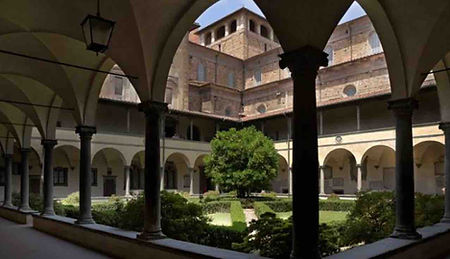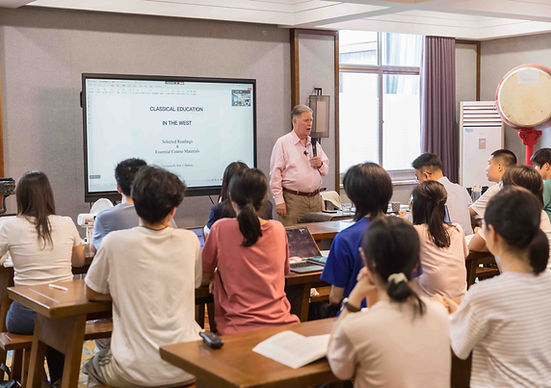James Hankins

Houghton Library, Harvard University
James Hankins
is a historian of the Italian Renaissance and a powerful voice in the movement to reform American education. 2025 marks his fortieth year of teaching at Harvard University, where he has focused on the classical tradition, political thought, the movement of humanism, and late medieval, Renaissance, and early modern European history.

Since publishing Virtue Politics in 2019, Hankins has been increasingly committed to writing for a wider public on topics of current interest. The center of his interest is educational policy, both at the K-12 level and in higher education, but he has also written on subjects as diverse as immigration, health care policy, and “virtue tech” (with Artur Kluz). In addition, he has written a number of reviews of art museum shows as well as historical essays on subjects relevant to current concerns. His public-facing writings have appeared in The Wall Street Journal, Law & Liberty, The Claremont Review of Books, The New Criterion, First Things, The American Mind, and Public Discourse.
In 2021 he was recruited by Encounter Books, together with his old friend from high school days, Allen C. Guelzo, to write a new textbook on the history of civilization in the West. This was published in 2025 as The Golden Thread: A History of the Western Tradition (2 volumes). Hankins is the author of volume 1, ranging over 2500 years from the ancient Greeks to the Western Renaissance

Riccardiana Library, Florence
Prof. Hankins' scholarly work has garnered many awards, including the American Catholic Historical Association's 2024 Helen and Howard R. Marraro Prize for Political Meritocracy in Renaissance Italy: The Virtuous Republic of Francesco Patrizi of Siena, the American Historical Association's 2020 Marraro Prize for Virtue Politics: Soulcraft and Statecraft in Renaissance Italy (which also won TLS best book of the year for 2020), the British Academy's 2024 Serene Medal for Italian History, and the Renaissance Society of America's 2012 Paul Oskar Kristeller Lifetime Achievement Award. He was elected a Corresponding Fellow of the British Academy in 2014 and a Member of the American Academy of Sciences and Letters in 2024.
James Hankins has been a professor at Harvard University since 1985 and will attain emeritus status in 2026. His career has taken him to many distinguished institutions, including Oxford University, where he was Carlyle Lecturer in 2010 and Visiting Fellow at All Souls College in 2014; the American Academy in Rome (Rome Prize 1981–82, residency 2014); the American Academy in Berlin (2013); and Villa I Tatti, the Harvard University Center for Italian Renaissance Studies in Florence (Fellow 1988–89, Visiting Professor 1992 and 2007). Many of his most precious hours have been spent in the great libraries of Europe. Dearest to his heart are the Riccardiana and Laurenziana in Florence, the Vatican Library in Rome, and Houghton Library at Harvard.
In 2026, he will become a Professor of Humanities at the Hamilton School for Classical and Civic Education at the University of Florida.

Laurenziana Library, Florence

All Souls College, University of Oxford

Prof. Hankins began serious engagement with China and Chinese scholars in 2013, when he was invited to participate in a symposium at Tianjin University commemorating the 500th anniversary of Machiavelli’s Prince. Since then he has lectured and given seminars on Western philosophy and political thought in numerous Chinese universities, including Peking University, Sichuan University in Chengdu, Shandong University in Qingdao, Fudan University in Shanghai, Hong Kong University, and the Chinese University of Hong Kong. He has also taught at the Que Li Academy in Qufu, the birthplace of Confucius. In 2025 he was appointed a Distinguished Researcher by the Nishan World Center for Confucian Studies. Two of his books are currently being translated into Chinese.
In 2017-18 Hankins and his colleague, Prof. Peter K. Bol, organized two conferences in Cambridge, MA and Shanghai, sponsored by the Harvard Global Institute, on the theme of Political Meritocracy in Comparative Historical Perspective. The insights gained from this collaboration fed into his Virtue Politics (2019) and inspired a number of essays in American Affairs and The Claremont Review of Books. Hankins does not consider himself a 中國通 (China Hand) and has never made it past Level 1 Mandarin, but he has gratefully drawn inspiration from the Confucian tradition in his comparative study of Eurasian classical traditions.
Publication Projects
I Tatti Renaissance Library
The I Tatti Renaissance Library makes the major literary, historical, philosophical, and scientific works of the Italian Renaissance written in Latin available to a broad readership. Each volume provides a reliable Latin text together with an accurate, readable English translation on facing pages, accompanied by an introduction and notes. Since 2001 the series has published over 100 volumes.
Patrizi Project
Devoted to the life and works of Francesco Patrizi of Siena, the greatest political philosopher of the fifteenth cetnury, and the principal exponent of the "virtue politics" of Renaissance humanism. The project promotes the publication of Patrizi's writings and the aggregation of scholarship about him and his thought.
Catalogus Translationum et Commentariorum
Founded in 1945, the Catalogus Translationum et Commentariorum is dedicated to the reception of classical authors during the Middle Ages and Renaissance. Each article treats a separate ancient author, beginning with a detailed essay on the author’s reception from antiquity to 1600. This Fortuna is followed by a comprehensive list both of printed and manuscript commentaries in Latin on the author and, in the case of Greek authors, a list of Latin translations as well.
More about James Hankins
James Hankins, born in Philadelphia, Pennsylvania, in 1955, received his B.A. from Duke University in 1977, where he majored in Classics and History. His primary undergraduate teachers in Classics were the archeologist and architectural historian Lawrence Richardson, Jr., and Francis Newton, with whom he studied medieval Latin and paleography. His mentors in Renaissance studies were Fr. Edward P. Mahoney, Ronald G. Witt, and Arthur B. Ferguson. He earned M. A. (1978), M.Phil. (1980) and Ph.D. (1984) degrees at Columbia University, where his Ph.D. advisor in History was the prominent Renaissance historian Eugene F. Rice. At Columbia he also studied ancient history with Roger Bagnall and William V. Harris as well as medieval canon law with Robert Somerville. For eight years he was research assistant to Paul Oskar Kristeller, a Jewish refugee from Nazi Germany and the greatest Renaissance scholar of the 20th century. Kristeller, though officially retired, served on Hankins’ dissertation committee and was his principal mentor. Hankins’ dissertation, “Latin Translations of Plato in the Renaissance,” was the nucleus of his first monograph, Plato in the Italian Renaissance (2 vols., E. J. Brill, 1990).
While at Columbia, the Italian Fulbright Committee awarded Hankins a graduate fellowship to study in Florence in 1980-81. He won the Rome Prize of the American Academy in Rome to study Plato manuscripts in the Vatican Library in 1981-82. From 1983-85 he held a postdoctoral fellowship at the Columbia Society of Fellows. In 1983 he married Virginia Brown, the distinguished paleographer and expert on the Benedictine culture of medieval southern Italy. Brown had been a Senior Fellow at the Pontifical Institute of Mediaeval Studies in Toronto since 1970. Virginia died of pancreatic cancer in 2009.
In 1985 Hankins was hired as an assistant professor of History at Harvard, where, after being promoted to full professor in 1992, he has spent his entire academic career. While at Harvard Hankins has held fellowships and visiting professorships from the Villa I Tatti (the Harvard University Center for Italian Renaissance Studies in Florence), the Guggenheim Foundation, the American Academy in Berlin, the Institute for Advanced Study in Princeton, the American Academy in Rome, All Souls College, Oxford, the Center for Ethics and Culture at the University of Notre Dame, the James Madison Program in American Ideals and Institutions at Princeton, and the Hamilton School of Classical and Civic Education at the University of Florida.
At a meeting of the I Tatti Council in 1998, Hankins agreed to serve as General Editor of a new bilingual text series, the I Tatti Renaissance Library, intended as a “Loeb Library for Renaissance Latin Texts.” The series published its first three volumes in 2001. Hankins retired as General Editor in 2025 after the series published its 100th volume. He will retire from Harvard University in June, 2026, and will take up a professorial appointment at the Hamilton School in August 2026.
Throughout his professional career and following the example of his great mentor Kristeller, Hankins has devoted a great part of his scholarly energies to making available in text editions and translations the Latin literature of the Italian Renaissance. This rich literature, relatively unstudied before Kristeller’s pioneering researches from the 1930s to the 1990s, represents a key phase in the revival of the classical tradition and documents the transition between the medieval and modern West. Latin humanistic literature of the Renaissance also provided the seedbed for the first flowering of the modern vernacular literatures of Europe. Hankins’ work on Renaissance Platonism, especially his studies and editions of Marsilio Ficino, has been credited with providing a model for the reception history of the classics over the last three decades. His work on the historian and humanist translator of Aristotle, Leonardo Bruni, offers revisionist readings of many key texts and documents the extraordinary popularity and influence of Bruni’s “civic humanism” in the Italian quattrocento.
In 2010 Hankins was invited to give the Carlyle Lectures in the History of Political Thought at the University of Oxford. Hankins had been interested in Bruni and civic humanism since the time of his studies under Ronald G. Witt at Duke, but the Oxford lecturership was the proximate occasion for a major reorientation of his studies. From 2010 onwards Hankins aimed to produce a new synthetic interpretation of Renaissance political thought, which eventually appeared in monographic form as Virtue Politics: Soulcraft and Statecraft in Renaissance Italy (The Belknap Press of Harvard University Press, 2019). In 2023 Hankins published a monograph on Francesco Patrizi of Siena (1413-1494), whom he presented as the most important political philosopher of the quattrocento and the leading exemplar of Petrarchan virtue politics. From 2020 he has been the principal investigator of the Patrizi Project, a research group devoted to making better known the work of this neglected figure.
A full list of James Hankins' academic publications is available here.









